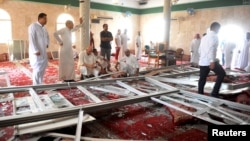Islamic State militants claimed two bombings in the Arabian peninsula on Friday targeting Shi'ite mosques, as Iraq's vice president questioned the effectiveness of U.S.-led airstrikes against IS forces.
A group describing itself as a newly-established affiliate said it was responsible for a blast in the eastern Saudi Arabian governorate of Qatif that killed at least 19 people.
A second bombing near a mosque in the Yemeni capital Sana'a wounded 13, adding to the growing number of casualties outside Islamic State's usual geographic targets in Syria and Iraq.
Speaking at the World Economic Forum in Jordan Friday, Iraq's Vice President Ayad Allawi said he has asked Iraqi leaders to form a strategy in the face of what he sees as a failed air campaign that is not controlling the militant group's growth.
"The coalition [US-led international coalition against Islamic State] meets and then retreats, there are no good news from the international coalition, and there is no strategy, so I asked the Iraqi leaders to put a strategy together and to present it to the coalition.
"The international coalition meets but without any results, the airstrikes do not solve the problem," Allawi told reporters at the World Economic Forum in Jordan on Friday.
Increasing strife
The attack comes amid mounting Sunni-Shi'ite sectarian tensions across the Arab world due to conflicts in Iraq, Syria and Yemen.
Amateur video showed Saudi rescue workers arriving at the Imam Ali Shi'ite mosque in Qatif Friday as worshippers mulled around the entrance to the building and victims of the blast were being carried out.
Pictures posted on social media show injured or dead victims in blood-soaked clothes being taking to ambulances parked outside.
White House spokesman Josh Earnest condemned the attack and called it indicative of extremist tactics.
Saudi Grand Mufti Abdel Aziz Al Shiekh, the country's top religious leader, told Saudi TV that the attackers were trying to inflame sectarian tensions and cause chaos both inside the country and along its borders. But, he argued that Saudi society is strong and its leaders are wise, minimizing the dangers.
Sectarian violence
Lebanese researcher Hamza Hassan told Al Manar TV that certain extremist Sunni clerics have long tried to incite sectarian strife by declaring Shi'ites “heretics.”
Saudi Arabia's former Grand Mufti Sheikh Abdel Aziz Ben Baz, who died in 1999, declared Shi'ites to be “heretics” in a historic broadcast still posted on extremist Sunni websites.
With the Islamic State claiming to have carried out Friday's mosque attack, Hilal Khashan, who teaches political science at the American University of Beirut, told VOA that the militant group is actively working to foment a Sunni-Shi'ite conflict across the Middle East.
“As we all know, one of the objectives of ISIS is to instigate a Sunni-Shi'ite civil war throughout the region. They think that such an act---the suicide bombing in the Shi'ite mosque---will contribute to such an eventuality," he said.
Sectarianism has played a major role in the conflict in neighboring Iraq. A massive explosion, which ripped apart the famous golden domed Shi'ite shrine in the Iraqi town of Samara in 2006, set off a bitter and bloody sectarian conflict in Iraq in which thousands of people were killed.




